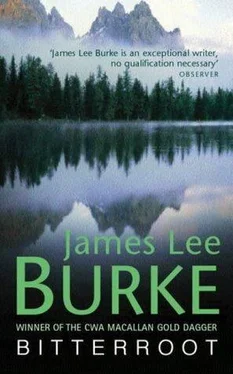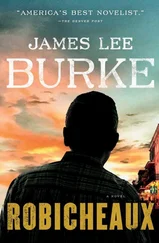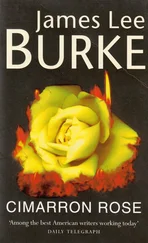He cupped his hands to his face and an unintelligible sound came out of his mouth. His white shirt was splattered with blood and his eyes were filled with pain and rage. His hand went inside his suit coat and closed on the butt of an automatic pistol.
I grabbed his wrist with my left hand and tore my.38 from its clip-on belt holster and slammed him against the front of his car and wedged the.38 into his mouth, my hand still gripped on his wrist. He gagged on the two-inch barrel and I pushed it deeper into his throat, bending him back against the car. Blood and spittle ran from his mouth and I heard the automatic fall from his hand onto the cement.
Then someone pressed a pistol against my temple.
"Let Jim go, Mr. Holland," Amos Rackley said.
"Kiss my ass. You take that gun away from my head," I said.
"You're not in a bargaining position," he replied.
"Watch this," I said. I fitted my left hand on the throat of the man called Jim and shoved the.38 deeper into his mouth and cocked the hammer with my thumb, the cylinder actually clacking against his teeth now. "You take your piece away from my head or I'll empty his brainpan on the hood."
Rackley lowered his gun. I released the man named Jim and stepped away from him.
"You fucking lunatic," Rackley said.
"You jump out of cars at people and pull guns on them, this is what you get," I said.
"What do you call this?" he said, and reached into the backseat of his car and shoved the morning newspaper at me. It was folded back to a red-circled classified ad that read, "Amos Rackley, Please Get in Touch. I Don't Feel Like Cleaning Up Your Mess- Billy Bob Holland."
"I think you're deliberately letting Wyatt Dixon and Carl Hinkel stay in circulation so they'll lead you to other conspirators in the Oklahoma City bombing. In the meantime they're hurting innocent people."
"You just assaulted a federal agent," he replied.
"There're must be twenty spectators watching this from the bridge. I wonder what they'll have to say about who assaulted whom. You want to get a news reporter down here?"
"You're threatening me?"
"It's not a threat, Mr. Rackley. You point a gun at me again and I'll pick your cotton."
He tossed the newspaper at my face. The pages broke apart in the wind and blew down the walkway. His fellow agent cleared his mouth of blood and spat it on the cement, then bent over and retrieved his automatic and replaced it into its holster. There was a large red knot on the bridge of his nose.
"I'm sorry I hurt you," I said.
"Blow me, Gomer," he replied.
I slipped the.38 back into its clip-on holster. I saw his eyes travel to the holster's position on my belt.
"It's unconcealed. I don't need a permit for it. Welcome to Montana," I said.
That night I took Temple to the Joan Baez concert at the university. The auditorium was packed, the air stifling. But the crowd didn't care. They were wild about Joan. George McGovern was in the audience and she introduced him as an old friend. She was sweating in the lights, her clothes sticking damply to her skin. Finally she touched her wrist to her brow in desperation and said, "I have to be honest with you. I've never been so hot in my life. Sweat is actually running down the backs of my legs."
A man in the balcony stood up, cupping his hands to his mouth, and shouted, "That's all right, Joan! You're still beautiful!"
The crowd roared. Her humor and grace, her sustained youthfulness and lack of any bitterness, and the incredible range of her voice were a conduit back into an era thirty years gone. For two hours it was 1969 and the flower children still danced barefoot on the lawn at Golden Gate Park.
But seated in the second row, in the seat next to the right aisle, was a man in a domed white hat with an Indian band around the crown and garters on his sleeves. In the glow of the stage lights his face looked as smooth as moist clay, clean of all imperfections, flat-bladed, the jaw hooked, the eyes fascinated, like those of a visitor in an alien environment.
He never applauded nor did his facial expression ever change from one of bemused curiosity. At intermission he remained in his chair, his rectangular posture like stone, so others had to labor to get around him.
"L.Q. Navarro used to say there are two Americas," I said to Temple.
"How's that?" she said, watching the musicians regroup on stage.
"One bunch wants good things for the world. The other bunch thinks the earth is there to be ground up for profit. The cutting edge for the second bunch are guys like Wyatt Dixon."
"Are you telling me he's here?" But just at that moment the man in the domed white hat went out the fire exit and let the metal door slam behind him.
"I just miss L.Q. sometimes," I said. The lights went down and Joan Baez came to the microphone and introduced her niece. Temple was whispering to me behind her hand, something about the song "Silver Dagger," when I realized Cleo Lonnigan and her gay carpenter were seated three rows in front of us. Cleo had happened to turn and look up the aisle, and suddenly I was staring into her face.
I started to wave, then thought better of it.
"What's wrong?" Temple asked.
"Nothing," I replied. But Temple followed my eyes to Cleo.
"Oh, it's Dr. Bedpan," Temple said.
"Come on, Temple," I said.
"Is she still staring at us?"
"No."
"Good. I was worried. I thought it was she who was rude and needed correcting."
Temple gazed benignly up at the stage. At the end of the concert the audience brought Joan back on stage three times. The auditorium was sweltering now, the air fetid with body odor. After Joan left the stage a final time, someone opened a side door and the auditorium was suddenly flooded with cool air. I put my hand on Temple's arm and steered us for the exit.
Too late.
Cleo Lonnigan stood solidly in our path. "Was Little Miss Muffet whispering about me?" she asked.
"Muffet?" Temple said.
"I'm sure you get my meaning," Cleo said.
"Shut your mouth, Cleo," I said.
"Hey, Cleo, let's ease on out of here," Eric, Cleo's carpenter friend, said.
"I'm sure that's just part of Dr. Lonnigan's regular pillow talk. She doesn't mean anything by it," Temple said to me.
"Look at me," Cleo said.
"Oh, I don't think so," Temple said.
"If you ever whisper behind my back or try to ridicule me in public again, you'll wish you were back waiting tables or whatever you did before somebody let you in a junior college."
I put my arm around Temple's shoulders and almost forced her out the door.
"Would you get your arm off me, please?" Temple said, flexing her shoulders, her neck flaring with color.
"I apologize for that in there."
"You actually went to bed with her? It must be horrible remembering it."
"Why don't you ease up, Temple?"
The sky was green, the evening star glittering like a solitary diamond over the mountains in the west.
"Billy Bob, don't you see it?" Temple said.
"What?" I said, confused.
"It's that woman in there, or it's me, or a female DEA agent, or an old girlfriend from high school. We're just Valium. You're married to the ghost of L.Q. Navarro."
That night dry lightning rippled through the thunderclouds that sealed the Blackfoot Valley. The wind was up and the trees shook along the riverbank and I could see pine needles scattering on the surface of the water. I walked through Doc's fields, restless and irritable and discontent, a nameless fear trembling like a crystal goblet in my breast. The Appaloosa and thoroughbred in Doc's pasture nickered in the darkness and I could smell river damp and pine gum and wildflowers and wet stone and woodsmoke in the air, as though the four seasons of the year had come together at once and formed a dead zone under clouds that pulsed with light but gave no rain. I wished for earsplitting thunder to roll through the mountains or high winds to tear at barn roofs. I wished for the hand of God to destroy the airless vacuum in which I seemed to be caught.
Читать дальше












